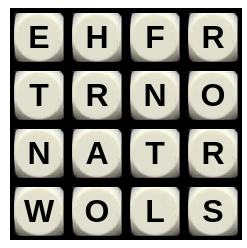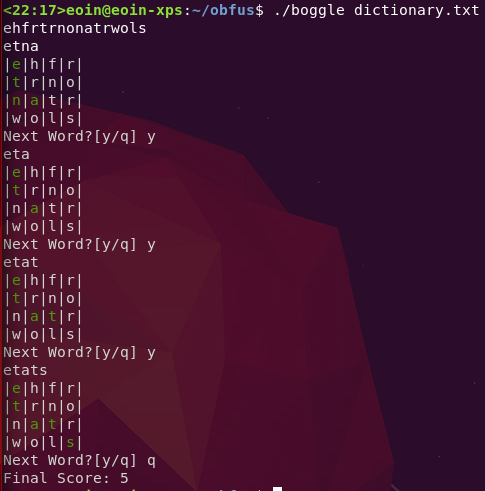Boggle.c
Have you ever wanted a program to play boggle for you, but haven’t been happy with how readable the available programs are?
Then I have good news for you, below you can find a boggle playing program with 0% readability but 100% boggle board shape
#include<stdio.h>
#include<stdlib.h>
#include<string.h>
char m[]="a$-??'" "$-$$$"
"??'??'-??'$??'""" "??'(("
"())*+-\\34;6zI95(" "?`z\0"
"\x1B[3" "2m\0" "\x1B["
"37m" "\0Ja|" "p$Skv`;_}" "+uY$\0""_ *__," "90],b[4] [4];v[4][4" "sr,i;/****"
"38?M4 ^O><g:/ *(UkaA)WW=GJ€eV 4[=b'F?a2@9L/)LnW$ g,H`X7>[(%?G&pc*c;pE^p:X =$L'B[:763ckRmW"
"+B*;i<r@Kg*H-O2h BNZ08l1R?KYYGeV5* 7=!`ogpmLAZYr4jZcP8 mkG]:4h>O&T&MW#WZj%17+/Ch fGPQ@J:86T@RO-Y=5?"
"KJ]-U_VK7?YnSMK nVMil39b*=[bD89GWRFo4`CFY7C^$[(g6V.XbVeE/W_jm9]Dr``eR?`e-L8hH8T Ro0;<:N^ M#9_l^"
"cGWKa3jVM>_o3C`0 7G1N=B [email protected]?&*3 r!_fE=l U7Y*QMr =.PIF(- %HUi#P [P8Li'a]A,'K@`Tdk$G"
"c`n?' DK5VNV1:Vn`0^ #'c4'-On/,p,F K%39RX8 L(,DH>V ?+oZ^`D &D/V.` )_XV@5D/9BXfV^BH/!"
"_-AKB rIbL+-d[8?W%k (*:IrP,XJc0QH TdgDl'^ .hASU)- >RY=>C# J.3?dd c[OP?=&[C>nXgaF-n"
"A4Rr$ +TLhi*[Y<Q'L9 (0cB6b>0=aNBl$ TUCnfQi ]WW#:FTe #-h7,em 5;mP@- Qf^mh=[-"
"78*5CB6jA[2cGE?NE)6F[ALXl^28SiVajj-'ORD+pU,L)0gMn='T!?Q EV]D=ljT:;48'cEr0I9$Li0WQKbE=HnP+9f0"
"n[JN4V@KQ5Ge;^gb)d 3!,o!!Le%oZ*ANK:! $hg4Y,^C9<7gEIo*dP 1/2%[TJbE6$:=2Zd5YBf``T/@. 0@eJ!$(:d?;R12:d"
"PQ,-&=p'1DZAI&0!@ 7:MR6ZR>:!b8ZEV m9m:%!?hBXE__Tr9, l#jBVQZCTm]a^e$Y!`J:`T::= -Y24`V;[<%f06Z_"
"-p670l]W6D+c=gLo (rBLGX6(Cl2 i4D,Z!@5/kMB5;3 Ndgo5aQiR<:VQcT1o7AH)fr #`+D8i%G6CojH"
"f95T>E Y^KGOc"
"E%OM4 'Dc]_3A T&:/i9 ]#4eSP"
",E^LBQU 6V4)*EW@ rF.KE<Rd 7Bd'4D^"
"Y@E*.n(H19UNml%U4 g&)7<A':o]bL<9aWP"
"*Wd9Pk&#?$*[^5K A5iNirl)V;b.YZ/"
"*",_,*__,u [90],b[4][4]
;v[4][ 4],sr,i;
typedef/**/ struct nd nd ;struct nd{ int nd;nd*h[
26];}*r;is( char*c,nd*r) {if(*c&(1<<5 ))i=*c-*m,r
->h[i]=r->h[ i]?r->h[i]: calloc(1, sizeof(nd)),
is(c+1,r->h[ i]);r->nd=*c &(1<<5)?r-> nd:1;}tr(int
x,int y,nd*r ,int d){if(r ->nd&&d>2){ sr+=d>7?11:m[
(1<<4)+d]&7; if(pr(d)) return 1;} for(int t=0;t
<8;++t){int nx,ny;nx=1+x -(m[t<<1]&3) ,ny=1+y-(m[t
<<1|1]&3);if (nx>=0&&ny>= 0&&nx<4&&ny< 4&&!v[nx][ny
]&&r->h[b[nx ][ny]-*m]){v [nx][ny]=1,u [d]=b[nx][ny
];if(tr(nx, ny,r->h[b[nx] [ny]-*m],d+1) )return 1;v[
nx][ny]=0,u[ d]='\0';}} return 0;}pr( d){puts(u);
for(i=0;i<16 ;++i)printf( "%s%s%c%s|%s" ,i&3?"":"|",v
[i>>2][i&3]? m+38:"",b[i >>2][i&3],v[ i>>2][i&3]?m
+44:"",(i+1) &3?"":"\n"); __=m+50; while(*__)
putchar(((*( __++)-(1<<5) )^(1<<2))+(1 <<5));scanf(
" %c",&_); return _!='y'; }main(int ac, char ** av){
FILE*d=fopen (av[1],"r");r =calloc(1, sizeof(nd));
while(fgets( u,90,d))is(u,r );fclose(d); memset(u,0,
sizeof(u)); for(i=0;i<16 ;++i)b[i>>2] [i&3]=
getchar(); for(int t=0; t<16;++t){ if(r->h[b[t>>
2][t&3]-*m]) {v[t>>2][t&3] =1,u[0]=b[t >>2][t&3];if(
tr(t>>2,t&3, r->h[b[t>>2][ t&3]-*m],1)) break; v[t>>2
][t&3]=0,u[0] ='\0';}}__=m+ 24;while(*__ )putchar((*(__
++)-(1<<5))^ (sizeof(u))+(1 <<5));printf ("%d\n",sr);}
Compiling
This program must be compiled with the -trigraphs flag enabled
Ex: gcc -trigraphs -o boggle
This should be run in terminals supporting ANSI colour codes
(You will get a lot of warnings, this is the penance the code is paying for the sins involved in its creation)
Usage
The syntax for running this program is ./boggle <dictionary file>
The dictionary file must contain only lowercase latin characters
The program will then accept the boggle board through stdin, input the board as a single line of 16 lowercase latin characters
The program will then print the words on the board, one at a time, highlighting the required letters in green
Example


The Algorithm
Before explaining the algorithm I’m assuming knowledge of graphs and tries
The thing to notice about a boggle board is that it is an implicit trie. The intuition for this is that chains of adjacent letters are exactly like paths through a tree structure. By interpreting the boggle board as a trie we can efficiently process it
The algorithm works as follows
- Construct a trie from the given dictionary file
- Use a depth first search approach to find the common paths of the dictionary trie and the the implicit boggle trie, ie. Traverse the boggle board depth first, only taking paths that match existing paths in the dictionary trie
- For every full word reached, print the word and its path through the board
The Obfuscation
The program above uses a lot of common obfuscation tactics, aided largely by my own unreadable style of programming. My personal favorite part is the string at the top that writes out “Boggle”, 90% of the string is randomly generated garbage, but the logic for moving on a 2d plane, the logic for scoring the game, and the logic for the hardcoded strings are all hidden in the string